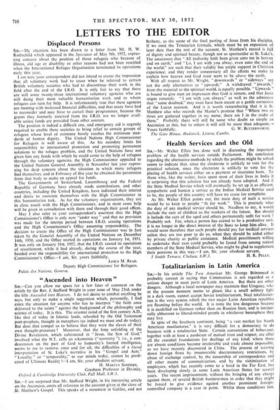Health Services and the Old
SIR,—Mr. Walter Elliot has done well in discussing the important problem of the health services outside Parliament. His conclusion regarding the alternative methods by which the problem might be solved seems to indicate that, since the electorate is unlikely to vote for the practical solution, since the electorate is unlikely to vote for the placing of health services either on a payment or insurance basis. To those who, like the writer, have spent most of their lives in India it is surprising that this solution has not already been adopted. And if the State Medical Service which will eventually be set up is as efficient, sympathetic and human a service as the Indian Medical Service used to be, the people of this country will have no cause for complaint.
• As Mr. Walter Elliot points out, the main duty of such a service would be to keep to people " fit for work." This is precisely what the duty of any medical service should be. Needless to say, it would include the care of children as the workers of the future. But should it include the care of the aged and others permanently unfit for work ? Probably not. For, when-a person has ceased to be a productive unit, it is no longer in. the direct interest of- the State-to keep-hirmalive. It would seem therefore that such people should pay for medical services unless they are too poor to do so, when they should be aided either by private charity or public assistance. Medical practitioners willing to undertake their care could probably be found from among retired members of the State Medical Service, who might be glad to supplement -their pensions in this way.—I am, Sir, your obedient servant,










































 Previous page
Previous page